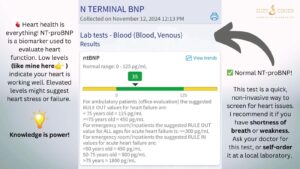What's On This Page?
ToggleThis blog on left ventricular hypertrophy has been written for people with symptoms that come and go, but mainly ruin your ability to get things done! It applies to athletes, men, women and those with chronic illness.
Maybe you take it for granted but your heart is the ultimate multitasker. It never stops right, not even when you sleep! It pumps tirelessly, adjusting to life’s demands, whether you’re conquering a work deadline, chasing after kids, or hitting the gym. But just like any overworked system, your heart can get stressed. When it’s under constant pressure, from high blood pressure, stress, or hormonal changes, it may start bulking up in a way that’s not healthy. This condition is called Left Ventricular Hypertrophy (LVH), and it’s your heart’s way of signaling, “I’m overwhelmed!”
LVH happens when the walls of the heart’s main pumping chamber – the left ventricle – get thicker. It happens because the heart works too hard, or when blood pressure remains too high or sometimes when your heart has to pump against stiff blood vessels. The thicker wall of the chamber makes the heart less flexible. Then it can’t pump blood as efficiently. Over time, this can cause problems like chronic fatigue, shortness of breath, or even heart failure if not treated.
But here’s the great news: Left Ventricular Hypertrophy is not a permanent sentence and for some people, it doesn’t impact their life very much. But at the same time, it’s not something you want to ignore either, especially because treatment strategies are so easy and affordable. Why would you ignore it?
With the right strategies, either medical and holistic, you can help your heart recover, gain some flexibility, and thrive. Let’s dive into what left ventricular hypertrophy is, how to recognize it, and most importantly, how to protect your heart from its effects.
LVH in Women: Unique Risks and Challenges
Women experience LVH differently than men due to factors like hormones, pregnancy-related complications, and even menopause. Left ventricular hypertrophy symptoms in women may mimic anxiety or other conditions, leading to underdiagnosis or misdiagnosis. Chest tightness or palpitations are often misattributed to stress or panic attacks. With men, they may more c

ommonly report exercise intolerance or physical symptoms like edema.
Heart disease is the leading cause of death for women in the United States, yet symptoms often go unnoticed or fly under the radar of practitioners for years. LVH is one of those “silent warnings” you don’t want to miss. Here are some key points as it pertains to women:
- Hypertension During Pregnancy: Conditions like preeclampsia and gestational hypertension increase the risk of developing LVH later in life. Speaking of preeclampsia, did you know aspirin helps it? READ THIS.
- Menopause: The drop in estrogen levels post-menopause can lead to stiffer arteries and higher blood pressure, a double whammy for your heart. I wrote an article, Handling Menopause and Andropause as a Couple. You may also want to read, 8 Hormone Strategies for Fatigue and Menopause.
- Stress and Anxiety: Chronic stress disproportionately affects women, raising cortisol levels and indirectly straining the heart. Cortisol hormone contributes to left ventricular hypertrophy by increasing blood pressure, making vessels stiffer, and amplifying the heart’s workload. This remodels and thickens the left ventricular wall.

To Diagnose It…
Echocardiography or “ECHO” as it’s usually referred to is the gold standard for diagnosing left ventricular hypertrophy. It provides detailed images of the heart’s structure and measures:
- Left ventricular wall thickness (normal is ≤11 mm).
- Left ventricular mass index (LVMI), which adjusts the mass for body size.
Also, your doctor will ask you about your symptoms which I talk about next. And finally, there are other clinical tests like a cardiac MRI that can be done to determine if you have left ventricular hypertrophy. Blood tests such as a ProBNP can be done with a quick needle stick to assess heart failure.
4 Major Symptoms of LVH: What to Watch For
LVH symptoms may overlap with other conditions including iron deficiency anemia (READ MORE), making it easy to ignore them. Keep an eye out for these main symptoms:
- Unexplained fatigue (not just the “I didn’t sleep last night” kind!)
- Shortness of breath, and it’s noticeable during routine activities
- A heavy or tight feeling in the chest
- Palpitations or irregular heartbeats
Plus 6 Additional Key Symptoms to Look Out For:
- Dizziness or Lightheadedness:
- A common sign of reduced cardiac output, especially during physical activity or when you stand up quickly. You may want to read this very important article I wrote, 10 Ways to Treat Sudden Low Blood Pressure.
- Swelling (Edema):
- Swelling in the legs, ankles, or feet can occur if LVH progresses to heart failure, as the heart struggles to pump blood effectively.
- Difficulty Exercising:
- An early symptom is reduced tolerance for physical activity, even simple tasks like climbing stairs may leave you out of breath.
- Nighttime Symptoms:
- Orthopnea: Difficulty breathing when lying flat. This can indicate fluid buildup in the lungs. This particular symptom is associated with advanced left ventricular hypertrophy because it means significant compromise and fluid buildup in the lungs (a condition called pulmonary congestion which is common in asthmatics).
- Paroxysmal Nocturnal Dyspnea: Sudden shortness of breath that wakes you from sleep. This is another symptom of advanced LVH and it makes it difficult to breathe. This is one hallmark sign of heart failure, but it’s also a symptom of several other conditions.
- Heart Murmur:
- A doctor might hear a heart murmur, which is an unusual sound in your heartbeat, and it could mean that LVH is causing changes in your heart’s shape or how blood moves through it.
- Cognitive Changes:
- In severe cases, poor blood flow due to a weakened heart may cause confusion, forgetfulness, poor focus or other cognitive problems. It happens because the thickened walls of the left ventricle make the heart less able to pump enough oxygen-rich blood to the brain. It can cause vascular dementia too.
Medications: Friend or Foe?
Medications That May Increase Left Ventricular Hypertrophy Risk:
- Decongestants (ie pseudoephedrine): Often found in over-the-counter cold remedies, these can spike blood pressure.
- Anabolic Steroids: Used by some women for muscle building, these can thicken heart walls.
- Hormone Therapy: Certain hormone treatments, particularly in high doses, may indirectly stress the heart.
Medications That Help Treat Left Ventricular Hypertrophy:
- ACE Inhibitors/ARBs: These reduce blood pressure and prevent further thickening of the heart wall (ie enalapril, losartan).
- Beta-Blockers: They lower heart rate, giving your heart a much-needed break (ie metoprolol, carvedilol).
- Spironolactone: A potassium-sparing diuretic that reduces fluid retention and may reverse some LVH effects.
- Calcium Channel Blockers: Help relax blood vessels, lowering workload on the heart (ie amlodipine).
If you’re on medications for hypertension, talk to your doctor about monitoring your heart’s structure. Ask if an echocardiogram is appropriate, it’s like a selfie for your heart.
The Holistic Approach: Empowering Your Heart
- Be Picky with Salt: Sodium sneaks into packaged foods like that “healthy” canned soup you love. Swap it for fresh alternatives.
- Gentle Movement: Yoga, walking, or Pilates can reduce stress and blood pressure without overloading your heart.
- Prioritize Sleep: Studies show poor sleep quality (hello, insomnia) is linked to increased cardiovascular risks in everyone. Sleeping is important, read my other ARTICLE on xxx
Nutrient Deficiencies: What’s Your Heart Missing?
Did you know that the right nutritional supplements can literally reshape your heart for the better? A fascinating study titled “Nutritional supplementation with MyoVive repletes essential cardiac myocyte nutrients and reduces left ventricular size in patients with left ventricular dysfunction” (published in the Journal of Biological Regulators and Homeostatic Agents) found that a combination of carnitine, CoQ10, and taurine can significantly improve heart function.
In this study, 41 patients with poor heart function (ejection fraction ≤ 40%) were given either a placebo or these three supplements. The results were incredible: the patients receiving supplements had higher levels of these nutrients in their heart tissue and showed a reduction in left ventricular size—a big win for improving cardiac efficiency and overall heart health! Meanwhile, the placebo group experienced worsening heart function.

Here’s how each nutrient works:
- CoQ10 (100–300 mg/day): Supports energy production in heart cells and protects them from oxidative damage. Statins, like Crestor or Lipitor for example are often prescribed to lower cholesterol, can deplete CoQ10, a key antioxidant for heart energy.
- Taurine (500–2,000 mg/day): Helps regulate calcium in the heart muscle, reducing stiffness and improving function.
- Carnitine (1,000–3,000 mg/day): Transports fatty acids into cells for energy and supports mitochondrial function.
This combination works by repleting nutrients the heart needs to thrive, which may help prevent or even reverse the progression of left ventricular dysfunction. If you’re dealing with left ventricular hypertrophy or other heart conditions, this study highlights how powerful nutritional support can be—but always consult your healthcare provider before starting any new regimen.
Other Miscellaneous Vitamin and Mineral Deficiencies
- Vitamin D: Women with low vitamin D are at higher risk of left ventricular hypertrophy. Get your levels checked, and aim for sunshine or a supplement.
- Magnesium: This mineral is crucial for relaxing blood vessels and lowering blood pressure. Foods like spinach and dark chocolate (yes, chocolate!) are great sources. There are great supplements, make sure you take the one that helps your heart, rather than the one that is for constipation. HERE’S HOW TO TELL WHAT YOU NEED.
- Iron: Anemia from iron deficiency can make your heart work harder. Women are particularly susceptible due to menstruation and pregnancy. If you have GERD, you may also have a micro-loss of blood that could add up over time.
- L-Arginine: This is an amino acid and supports nitric oxide production, improving blood flow and reducing ventricular load. It may help some people, but not all.

Hawthorn is Known for Heart Support
Yes, there are studies investigating the effects of hawthorn (Crataegus species) on left ventricular hypertrophy (LVH). Research has explored hawthorn’s impact on heart structure and function, particularly in the context of cardiac remodeling and hypertrophy.
A study published in Cardiovascular Drugs and Therapy examined the effects of hawthorn extract on cardiac remodeling and left ventricular function in a rat model. Hawthorn treatment improved the structure and function of the left ventricle in early stages of heart stress caused by pressure overload. It helped prevent some of the damage and dysfunction associated with heart enlargement and may have potential as a treatment for conditions like early heart failure or hypertrophy.
Another fascinating study published in Cardiovascular Drugs and Therapy explored hawthorn extract’s effects on cardiac hypertrophy. The researchers found that hawthorn extract helped reduce the size of the left ventricular chamber and improved the heart’s ability to contract effectively.
Even though the left ventricle still grew in response to stress, hawthorn helped maintain healthier wall thickness and partially preserved heart function, showing its potential as a natural remedy to support cardiovascular health. While these results are promising, the study was conducted on animals.
Your heart is more than a muscle, it’s your lifeline. LVH is a wake-up call, but it’s also an opportunity to step back and care for yourself. From medications that ease the load, to magnesium-rich snacks and daily stress relief, you’ve got the tools to protect your heart. Because let’s be honest: the world needs your strength, but it also needs your heart to stay healthy and happy.

Suzy Cohen, has been a licensed pharmacist for over 30 years and believes the best approach to chronic illness is a combination of natural medicine and conventional. She founded her own dietary supplement company specializing in custom-formulas, some of which have patents. With a special focus on functional medicine, thyroid health and drug nutrient depletion, Suzy is the author of several related books including Thyroid Healthy, Drug Muggers, Diabetes Without Drugs, and a nationally syndicated column.



